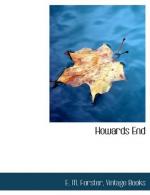|
This section contains 6,399 words (approx. 22 pages at 300 words per page) |

|
SOURCE: Hoy, Pat C., II. “The Narrow, Rich Staircase in Forster's Howards End.” Twentieth Century Literature 31, no. 2-3 (summer-fall 1985): 221-35.
In the following essay, Hoy discusses Howards End as a record of Forster's disillusionment with nineteenth-century idealism.
Forster's earlier novels, as well as Howards End, were shaped by his desire to do for modern England what Arnold and Ruskin had tried to do for Victorian England: deliver her from the repressive forces that were destroying her spirituality, her redemptive power. But Howards End is different. Earlier, Forster had advocated the body not the mind as the primary source of redemption; yet his was a cry, not for hedonism but for a radical revision of the terms of Progress in modern culture. Implicit in those earlier novels was his rejection of an “enlightened deliverance” growing out of pure rationalism. He kept reminding his readers that the body as well...
|
This section contains 6,399 words (approx. 22 pages at 300 words per page) |

|


